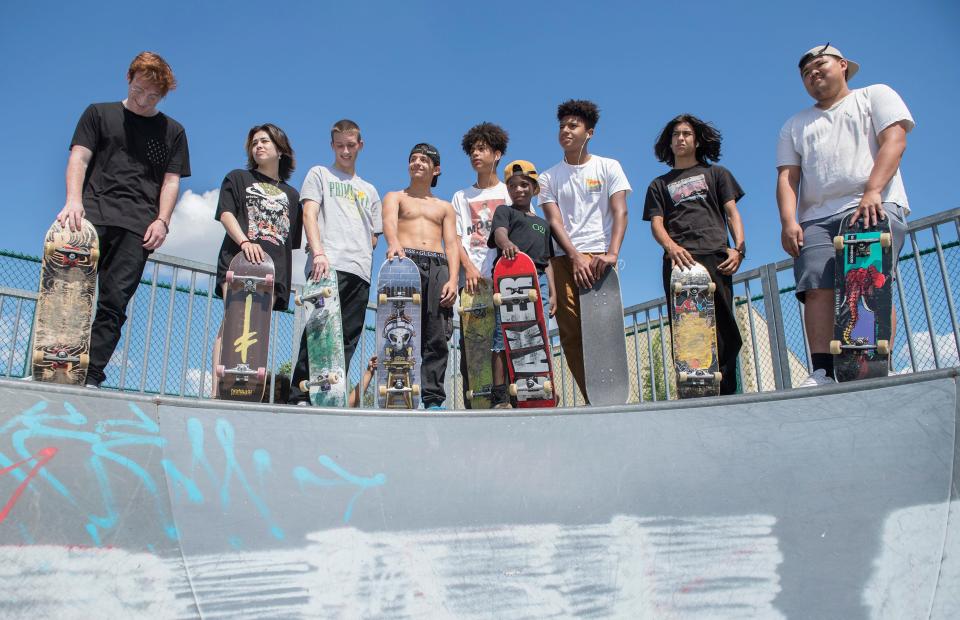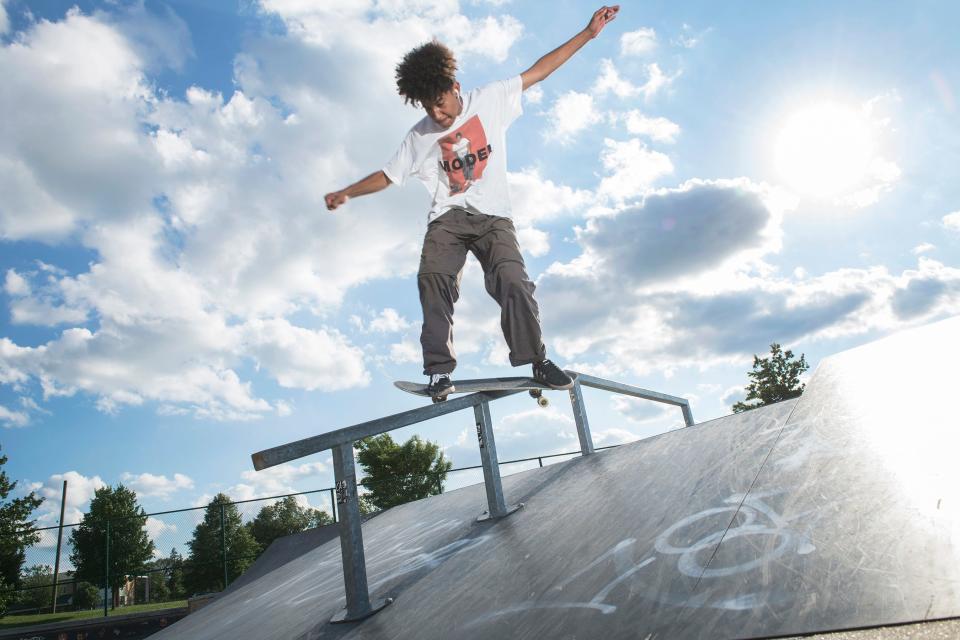Skateboarders say the culture welcomes diversity in a way other sports don't. Here's why
At the Pennsauken (New Jersey) Skate Park you'll find a skateboarder's paradise: rails, quarter pipes, ledges, and more than enough ramps to catch some air. To match the limitless opportunities for skaters to perfect their tricks, you'll find limitless backgrounds, beginners, regulars, girls, boys, adults, kids, lone wolfs, crews, crossing all racial lines just happy to be there.
"It's diverse because the skateboarding community is basically a family," explained Wander Peralta. "It doesn't matter what color you are, what race you are. You can be your own person when you skate."
Peralta, who has lived in Pennsauken Township for most of his life, says he discovered skateboarding because his older brother was a skater.

After watching videos of skaters, Peralta picked up his brother's board last summer set on learning to ollie, a trick that involves snapping the tail of the board off of a surface, lifting the entire board up into the air.
The first time he landed one, he realized the pride behind skateboarding.
"That's what I like about it. You get so excited to learn new tricks and then you land one. Like I landed my first ollie and it was one of the happiest days of my life. I was so happy," said Peralta.

Go Skate Day
Go Skate Day, celebrated in the US and around the world for more than 15 years, also comes as a day of happiness for skaters like Peralta. Each year on June 21, skaters take part in impromptu sessions and some organized events to celebrate the sport. And in the skateboarding culture, newcomers are always welcome.
"You can find your own home, skaters always look out for each other," said musician and professional skateboarder Chuck Treece. "We want that energy to feed of off of getting a new skater on the scene."
Treece, who became the first Black skateboarder on the cover of skateboard publication Thrasher Magazine in 1984, grew up going back and forth between his mom's house in Philadelphia, and his dad's in Wilmington, Delaware.

At the age of 11, Treece picked up a skateboard and started a long relationship with the sport. He recalls skating with Ezekiel Zagar, the son of famous Philadelphia mosaic artist Isaiah Zagar, and finding themselves as they transitioned into adulthood.
"I skated with Isaiah's son and we ended up making music together but we also ended having our own identity and that in itself was super important when your about to meet friends and getting out of high school and getting into your adult life," recalls Treece.
Before the Cherry Hill (New Jersey) Skatepark became legendary for its attraction of pro-skaters from California such as Jami Godfrey and Victor Perez in the 1980s, Treece said that it was a place where he and other Wilmington, Delaware, skaters would meet because of its close proximity to Philadelphia. Treece says that even back then it didn't really matter what your race was, it was about what you brought to the table.
"We had a great skatepark in New Jersey plus we still had some of our local parks," said Treece "We had three good years of using our local scenes which was like a kid going to a basketball court and integrating and saying white kids have to play with Black kids because if you want to play the game you have to play with everyone. And everyone has something to bring to that athletic table."
Treece also says the everyone-welcome attitude associated with skateboarding across the country plays a part in promoting diversity.
"It overshadows all of the undercurrents of why people can't get along because if you're accepted just for your skating your color really goes away," said Treece. "The whole 4/20 aspect of skating, there's this healthy holistic skating, there's longboard skating, there's freestyle skating, there's so many things, downhill skating. If you look at all of the aspects of skating you get to meet a lot of different people."
And as other sports and hobbies are reckoning with diversity issues, Treece believes skateboarding may be insulated against tension because the sport has always been a leader in inclusivity, it's just a matter of reminding people that.
"We're going to have to re-educate to ourselves that skateboarding is a place where you can be understood as you and that's the cool thing about it is that skateboarding didn't wait for the world to change, we kind of changed that ourselves," said Treece.
That inclusivity crosses multiple boundaries. Black women and the LGBTQ+ community have taken their place in the skateboarding culture.

J. Nyla McNeill, a 2019 ambassador for Black Girls Skate, a nonprofit dedicated to creating equity, visibility and safety for skaters who identify as women, nonbinary, or transgender and communities of color, says skate culture's inviting nature offers a deeper meaning to her.
"As a nonbinary adult, it's so fulfilling to see kids that are like non-gender conforming come up and say 'Oh you're like me', that is really beautiful" said McNeill, "It just all happens very naturally."
McNeill says competition is often the last thing on skaters' minds, making it easy for newcomers to show up and skate as their full selves.
"Once you work up the courage to go to the park it's likely that you're gonna see someone you resonate with," said McNeill. "A lot of the time there's no competition, people aren't on teams or anything, it's just like you bring your full self to this place."
Brianna Edwards, a Camden (New Jersey)-born skater who started in her teens and picked it back up at 27, said organizations that value and promote diversity and inclusion in skateboarding help grow the sport.
"Representation is important and organizations such as Black Girls Skate are helping expose more youth to skateboarding on an international level," said Edwards.
In Camden, Brant Beaupre, founder of Rising Leaders Skate Club, has been working to broaden skating's appeal to more kids since 2018. The club offers regular skate lessons and gives back to the community.
"I was trying to figure out a way I could do more with the kids, I'm not from Camden, I'm a white guy from the suburbs so I didn't think I could mentor really not having the same experiences as them but I wanted to do something," said Beaupre.
Under the direction of N'namdee Nelson, the executive director of nonprofit Rising Leaders that transitions at-risk youth into productive young adulthood, Beaupre offers weekly skate lessons on Saturday at Camden's Stockton Park from 10 to 11 a.m. and a chance for kids to be themselves.
"We have Black children, we have white children, we have Spanish children," said Nelson. "Kids just get an opportunity to be themselves while they have fun. Skateboarding wasn't something I was into personally but I've learned a lot. It's bigger than just kind of getting on a skateboard."
As the day for celebration of skateboarding worldwide approaches, Beaupre encourages people to embrace Go Skate Day's intent — to go skate regardless of size, age, race, gender, culture, orientation or labels.
"Skateboarding is great because people can just do whatever they want with it. They don't have to be 6'4, they don't have to weigh 180 pounds. Any size, any age, they can do it too," said Beaupre.
This article originally appeared on Burlington County Times: Skateboarders share why culture is more diverse than other sports

